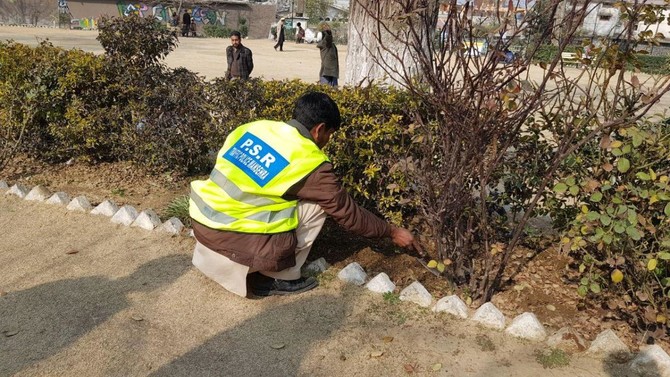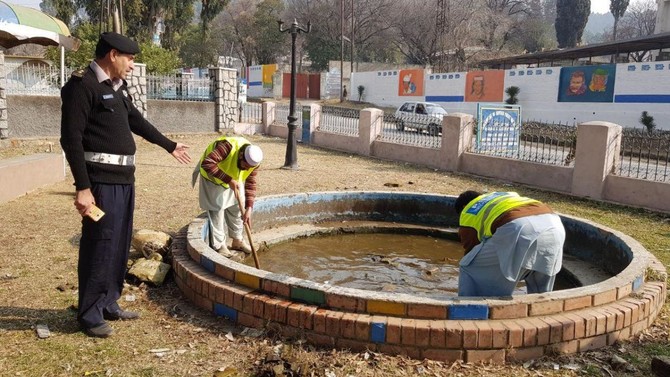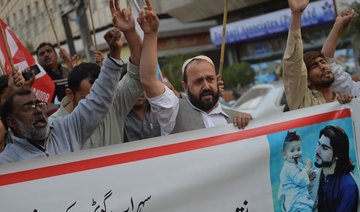MANSEHRA: Police in the Mansehra district of Khyber Pakhtunkhwa Province (KPK) have introduced 10-day community-service penalties for habitually negligent drivers — a first in Pakistan.
The offenders will have their licenses confiscated and will only get them back once they have completed their community service, which will involve socially beneficial tasks working in government departments including forestry, municipal administration, sanitation, and even traffic police.
Inspector Jamal Zeb of Mansehra traffic police told Arab News that offenders were only required to undertake community service for one hour a day, making it possible for them to go about their everyday lives.
“If someone does not wish to do it, he is made to do a short driving course at the traffic police driving school instead,” he added.
Syed Shahzad Nadeem Bukhari, the district’s senior police officer, explained that after an individual receives their 10th traffic ticket, his department is authorized to cancel the driver’s license.
Those drivers, Bukhari said “can work with any official unit for 10 days.” He added that the new scheme is designed “to promote a sense of public and civic service among people.”
Bukhari added that he had observed similar systems in certain developed countries as well. He hopes the initiative will help reduce road accidents in and around the city.
However, Noor Alam Khan, a KP-based lawyer, believes that while the police have the right to cancel driving licenses, the implementation of punishment is strictly the domain of the provincial assembly.
“If this unique mode of disciplining people has to be introduced, then the provincial assembly should turn it into a law and implement it in all districts,” he said.
But Bukhari deemed this unnecessary. “We have talked to heads of different government departments,” he said. “They are interested in our initiative since they need workforce. If someone is not interested in doing the one-hour social work for 10 days, he can opt to pay 4,000 rupees ($40) to take the driving course, since that is another way of reclaiming the license.”
Pakistan’s Mansehra introduces community service for traffic offenders
Pakistan’s Mansehra introduces community service for traffic offenders

More than 130 students in US join federal lawsuit over revoked visas
The initial complaint was filed by 17 students on April 11 in the state of Georgia
WASHINGTON: More than 130 international students across the United States have joined a federal lawsuit accusing the Trump administration of unlawfully canceling their visas, jeopardizing their legal status in the country, court documents show.
The students allege the Immigration and Customs Enforcement agency abruptly and illegally terminated their status in the government’s Student and Exchange Visitor Information System (SEVIS) database, putting them at risk of arrest, detention and deportation.
The initial complaint was filed by 17 students on April 11 in the state of Georgia.
Since then, 116 more have joined them as the administration of US President Donald Trump pursues a wide-ranging immigration crackdown that has targeted foreign students, among many others.
Across campuses in the United States, international students have been scrambling as they have discovered their visas have been revoked, often for little or no reason, according to court documents and media reports.
The Georgia lawsuit names US Attorney General Pam Bondi, Homeland Security Secretary Kristi Noem and Acting ICE Director Todd Lyons as defendants and seeks to reinstate the revoked visas.
In the complaint, which does not identify the students by name “due to fear of retaliation,” the summaries offered for each of the 17 original cases reveal seemingly arbitrary cancelations, with each plaintiff giving their best guess as to what may have prompted them to be targeted.
Some pointed to minor traffic infringements, such as John Doe 2, a Chinese citizen pursuing an engineering doctorate at the Georgia Institute of Technology.
He was notified by his school that his visa was revoked after a criminal records check, but the violation was not specified. The student believes it may have been related to a traffic offense that was closed and, according to the filing, he has no other criminal history.
Another of the students, an Indian national at New York Institute of Technology, said he had been found not guilty of shoplifting, and the case was dismissed.
“Over the past week, visa revocations and SEVIS terminations have shaken campuses across the country,” the complaint says.
“The SEVIS terminations have taken place against the backdrop of numerous demands being made of universities by the federal government and threats of cutting off billions of dollars in federal funding.”
The suit also noted that students’ removal from the government database could jeopardize the individuals’ ability to reenter the United States in the future.
Bulgarian government survives a no-confidence vote over corruption

- The government condemned the motion as an attempt to derail Bulgaria’s plan to adopt the euro at the beginning of 2026
- Rampant corruption has marred everyday life in Bulgaria for years
SOFIA: Bulgaria’s government on Thursday survived a second no-confidence motion in parliament in as many weeks.
The motion tabled by the Mech party and backed by two other nationalist and pro-Russia groups accused the government of failing to effectively combat rampant graft and bribery. It was defeated in a 130-72 vote in the 240-seat parliament. The government’s coalition Cabinet is led by the center-right GERB party.
The government condemned the motion as an attempt to derail Bulgaria’s plan to adopt the euro at the beginning of 2026, which would consolidate its European integration.
Contrary to its declared priority to stand up against corruption, the pro-Western opposition PP-DB did not support the motion, citing an upcoming European Commission report on Bulgaria’s bid to join the eurozone as a reason to avoid destabilizing the government.
“Any vote of no confidence before Bulgaria’s entry into the eurozone is not a vote to topple the government, but a vote to stop its pro-European course,” said PP-DB legislator Venko Sabrutev.
Rampant corruption has marred everyday life in Bulgaria for years, with dishonest public procurement, unregulated lobbying, vote buying and property fraud. Tackling graft has been complicated by the state of the judiciary, which is widely criticized for being beholden to the interests of politicians.
Russia’s top court lifts terror group designation on Afghanistan’s Taliban

- The move was a diplomatic victory for the Taliban
- Taliban delegations have attended various forums hosted by Russia
MOSCOW: Russia’s Supreme Court on Thursday lifted a ban on Afghanistan’s Taliban, who were designated as a terrorist group more than two decades ago.
The move was a diplomatic victory for the Taliban, who were put on Russia’s list of terrorist organizations in 2003, making any contact with them punishable under Russian law.
At the same time, Taliban delegations have attended various forums hosted by Russia as Moscow has sought to position itself as a regional power broker.
The court’s ruling on a request by the Prosecutor General’s office followed last year’s adoption of a law stipulating that the official designation as a terrorist organization could be suspended by a court.
Pakistan foreign minister to visit Kabul ‘within days’

- Islamabad has previously said it will deport more than 800,000 Afghans because they are linked to ‘terrorist’ and narcotics activities
- On Tuesday, the International Organization for Migration said Pakistan has expelled nearly 60,000 Afghans since the start of April
ISLAMABAD: Pakistan’s foreign minister said Thursday that he will visit Kabul in the coming days, as Islamabad’s campaign to expel Afghans has forced nearly 60,000 into Afghanistan.
Islamabad has previously said it will deport more than 800,000 Afghans because they are linked to “terrorist” and narcotics activities, but analysts say the move is politically motivated.
“Preparatory meetings have been ongoing and hopefully, within days, I will be visiting Kabul for a day to break this logjam which is there for the last few years,” said Mohammad Ishaq Dar, the foreign minister, who also serves as deputy prime minister.
Pakistan was one of just three countries that recognized the Taliban’s first government in the 1990s and was accused of covertly supporting their insurgency against NATO forces.
But their relationship has soured as violence in Pakistan’s border regions has soared since the Taliban regained power in Kabul in 2021.
Last year was the deadliest year in Pakistan for a decade, with Islamabad accusing Kabul of allowing militants to take shelter in Afghanistan from where they plan attacks.
The Taliban government denies the charge.
On Tuesday, the International Organization for Migration said Pakistan has expelled nearly 60,000 Afghans since the start of April.
The UN says nearly three million Afghans live in Pakistan, many who have been there for decades or were born there, after fleeing successive conflicts.
The Pakistan government has canceled the residence permits of more than 800,000 Afghans and warned those who are in Pakistan awaiting relocation to other countries that they must leave by the end of April.
More than 1.3 million who hold Proof of Registration cards issued by the UN refugee agency have been told to leave the capital and the neighboring city of Rawalpindi.
Mohammad Sadiq, Pakistan’s special envoy for Afghanistan, this month said the Pakistani Taliban (TTP) militant group was the top issue straining ties.
“TTP is a big challenge that can’t be tolerated. Afghanistan has to work with us on this. If they are not working on this, then all deals are off,” said Sadiq, who is currently visiting Afghanistan.
The TTP is a separate but closely linked group to the Afghan Taliban that carries out frequent attacks on Pakistani security officials.
Members of UK Jewish group say can’t ‘turn blind eye’ to Gaza war

- Members criticize the actions of Benjamin Netanyahu’s government in Gaza in an open letter published in the Financial Times
- Statement: ‘We cannot turn a blind eye or remain silent’ about the loss of life since a two-month truce collapsed on March 18
LONDON: Members of the largest organization representing British Jews have said they can no longer “turn a blind eye” to the war in Gaza, adding “Israel’s soul is being ripped out.”
In a major break with the Board of Deputies of British Jews’ policy of supporting the Israeli leadership, 36 of its members criticized the actions of Benjamin Netanyahu’s government in Gaza in an open letter published in the Financial Times.
“The inclination to avert our eyes is strong, as what is happening is unbearable, but our Jewish values compel us to stand up and to speak out,” said the letter, signed by around one in eight members of the Board of Deputies.
It is the first time since the start of the war that members of the body have publicly criticized the Israeli government.
“We cannot turn a blind eye or remain silent” about the loss of life since a two-month truce collapsed on March 18, as negotiations over the return of Israeli hostages broke down, the letter added.
Of the 251 hostages seized during Hamas’s October 7, 2023 attack on Israel, which triggered the war, 58 are still held in Gaza, including 34 the Israeli military says are dead.
“Israel’s soul is being ripped out and we, members of the Board of Deputies of British Jews, fear for the future of the Israel we love and have such close ties to,” added the letter.
The signatories accused the “most extremist of Israeli governments” of “openly encouraging violence against Palestinians in the West Bank.”
“We stand against the war. We acknowledge and mourn the loss of Palestinian life,” they added.
A spokesperson for the Board of Deputies told the Guardian that other members would “no doubt put more emphasis on the fundamental responsibility of Hamas for this ghastly situation.”
At least 1,691 Palestinians have been killed since the resumption of the Israeli offensive, bringing the death toll in Gaza since the start of the war to 51,065, according to Gaza’s Hamas-controlled health ministry.
Hamas’s attack on October 7 left 1,218 dead in Israel, mostly civilians, according to an AFP tally based on official data.




















